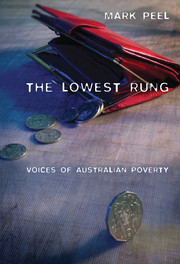3 - Suffering
Published online by Cambridge University Press: 22 September 2009
Summary
Losing ground
The welfare workers of Inala, Mount Druitt and Broadmeadows sometimes struggled to describe what they were seeing. They wanted to talk about poverty's damage without reassuring me, or themselves, that it was all going to get better. Helen Croydon and Patricia Stephenson, who had both lived in Broadmeadows for twenty years, said that ‘people feel more powerless now than at any other time since Broadmeadows became a suburb’. Patricia paused, and then added, ‘I don't know what else to say. I think people are just starting to feel powerless to affect what's going on.’ Helen offered support: ‘Oh, yes, that's true. It's all “what's the point?”.’ Patricia continued, ‘Yes, people say “it's all hopeless”’. After a pause, Patricia raised her hands, gesturing out of the window, and added, ‘I despair a bit too, I guess’. With a consoling half-laugh, half-sigh, Helen agreed. Theirs was a struggle to find words to describe despair that were not in themselves despairing and dispiriting. It was a conversation they'd had before and a conversation I heard in almost every welfare centre or neighbourhood house I visited.
If it is difficult to imagine the dimensions of need present in Australia's poorer places in the middle of the 1990s, an example from Broadmeadows gives as good an illustration as any. The CARE mission on Camp Road was one of the area's first welfare agencies, providing counselling, financial help and emergency relief to people in old Broadmeadows and Dallas.
- Type
- Chapter
- Information
- The Lowest RungVoices of Australian Poverty, pp. 62 - 86Publisher: Cambridge University PressPrint publication year: 2003



